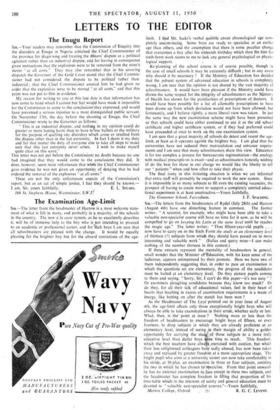LETTERS TO
THE EDITOR
The Enugu Report
SIR,—Your readers may remember that the Commission of Enquiry into the disorders at Enugu in Nigeria criticised the Chief Commissioner of the province for diagnosing and treating the Miners' dispute as a political agitation rather than an industrial dispute, arid; for having in consequence given instructions that the explosives were to be removed from the mine's stores " at all costs." They may also remember that in his covering dispatch the Governor of the Gold Coast stated that the Chief Commis- sioner had not considered the dispute to be political father than industrial ; that the Chief Commissioner assured him he had given no order that the explosives were to be moved " at all costs," and that this point was not put to him in evidence.
My reason for writing to you at this late date is that information has now come to hand which I cannot but feel would have made it impossible for the Commission to come to the conclusions they expressed, and would have prevented a serious injustice to a most distinguished public servant. On November 17th. the day before the shooting at Enugu, the Chief Commissioner wrote to the Governor as follows: " This is an industrial dispute, and nothing in my opinion could do greater or more lasting harm than to have toNise bullets or the military for the purpose of quelling any disorders which arose or resulted from the dispute other than in the last extremity. In fact I deem it my duty and for that matter the duty of everyone else to take all steps to make sure that this last extremity never arises. I wish to make myself quite clear on this score." This letter was not put before the Commissio0no doubt because no one had imagined that they would come to the conclusions they did. It does, however, seem most unfortunate that when-the Chief Commissioner gave evidence he was not given an opportunity of denying that he had ordered the removal of the explosives " at all costs."
These are not the only unfortunate aspects of the Commission's report, but as an act of simple justice, I feel they should be known.—
I am, Sir, yours faithfully, E. L. SPEARS. 164 St. Stephens House, Westminster, S.W.1.4(


































 Previous page
Previous page